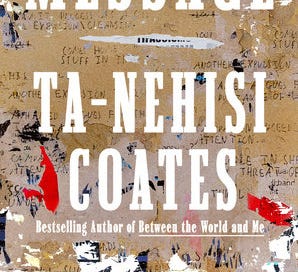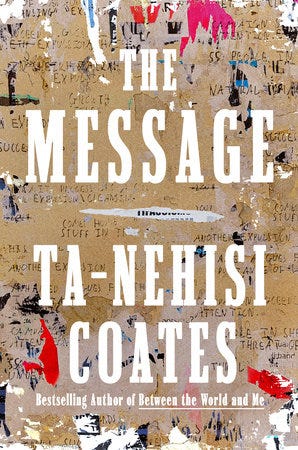Ta-Nehesi Coates stays on message
The controversial author points his glare at the Israeli-Palestinian conflict. What he sees won't surprise anyone.
By Ta-Nehisi Coates
Ta-Nehisi Coates’ The Message is a bold dive into race, power, and identity. With a mix of history and personal reflection, he pushes readers to face uncomfortable truths about systemic racism by painting a picture of a world where racism is not only enduring but deeply embedded, stretching its reach across borders and histories.
While reading the book, it feels like the author is jumping from topic to topic and place to place, with the only common denominators being race, identity, and the struggles between the colonized and the colonizers. (I only wish I were being hyperbolic.)
The book effectively exists as three parts:
The author reflects on his first visit to West Africa—Dakar—which leads to an examination of how personal and cultural narratives influence our identity and heritage.
He then dives into the banning of his book, Between the World and Me, at a school in South Carolina. He uses this as an opportunity to make that case for how American institutions continue to suppress uncomfortable realities about race and history.
In the third section, Coates takes aim at the Israeli-Palestinian, and it is here that he makes some of his most controversial claims, using words like “apartheid” to describe Israel’s treatment of the Palestinians.
A little housekeeping
I’m not a fan of Coates. To me, he represents the latest iteration of racial agitators from past decades—figures who, while condemning Martin Luther King’s nonviolent approach, contributed little to advancing Black Americans’ welfare.
In Between the World and Me, Coates excoriates American racism with passion, but his worldview is one where racism is so permanent, omnipresent, and omnipotent that he sees Black Americans as powerless to overcome it. He suggests that Black people’s vulnerability brings them closer to the meaning of life, unlike the quest for whiteness, which, he argues, divides others from it.
This perspective, offered by a college dropout who became a celebrated writer and millionaire, rings hollow to me.
Such views—whether ignorant or indifferent to the harm they cause—remain troubling.
Back to The Message
A central theme in The Message is Coates’ characterization of Western nations, especially the United States and Israel, as colonizing powers. He draws parallels between American expansion and Israel’s policies toward Palestinians, framing both as exercises in conquest and dispossession.
This comparison, however, has sparked significant criticism. Coates’ depiction oversimplifies the complex histories of both nations. In the case of Israel, his argument disregards the unique historical and existential realities of the Jewish diaspora, including the persecution that led to Israel’s establishment as a refuge for Jewish people. Labeling Israel a “colonizer” ignores the deep indigenous connection Jews have to the land, reducing a territorial conflict to European-style colonialism.
Likewise, Coates’ view of America’s expansion as merely colonialism overlooks the complex dynamics of migration, governance, and indigenous relations, diminishing the broader historical context.
Coates, a gifted writer, dabbles in moral absolutism, but in doing so, sacrifices nuance and limits the depth of his analysis.
Final thoughts
I won’t pretend to be an unbiased reviewer of The Message. Despite finding many of his arguments flawed, Coates’ perspectives on the Israeli-Palestinian conflict will find an audience.




